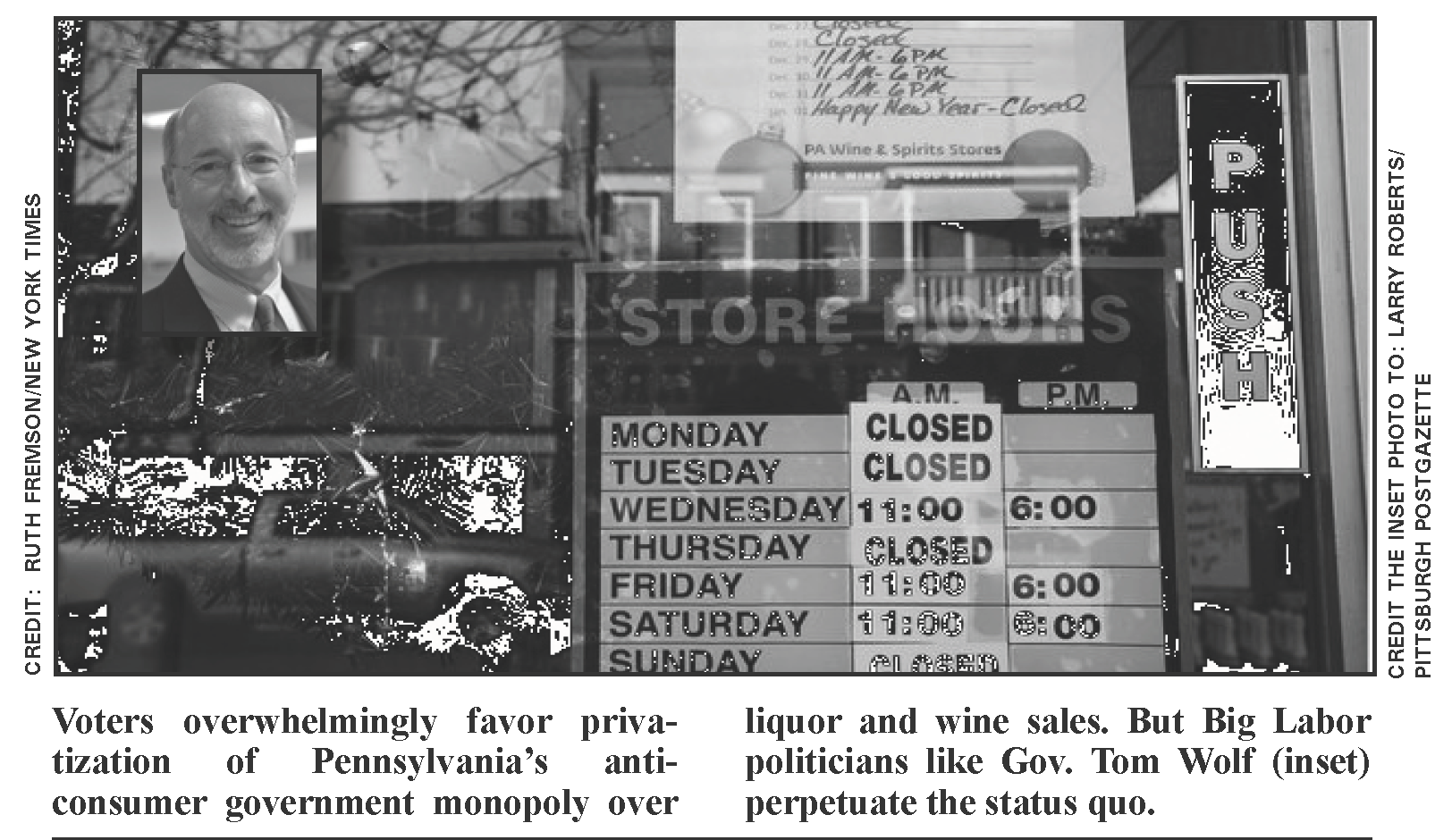Is This Any Way to Run a City’s Schools?
Leaked CTU Proposals Won’t Do Anything to Improve Schools’ Poor Performance
Consumers, Taxpayers Keep Getting Gouged in the Keystone State
(source: National Right to Work August 2015 Newsletter)
 Today Pennsylvania is one of just two states in which the government retains monopolies on retail sales of both liquor and wine consumed off premises.
Today Pennsylvania is one of just two states in which the government retains monopolies on retail sales of both liquor and wine consumed off premises.
According to recent polling, ordinary citizens in Pennsylvania overwhelmingly favor privatization of the sale of alcohol.
And there’s no compelling reason to believe Pennsylvania’s governor, Democrat Tom Wolf, really disagrees with the majority of his constituents about whether, in principle, the state government should maintain exclusive control over retail liquor and wine sales.
Government-Sector Union Density 6.7 Times as High As in the Private Sector
But in practice, Mr. Wolf does vehemently oppose privatization, no doubt primarily for one highly political reason:
United Food and Commercial Workers (UFCW) union bosses wield monopoly-bargaining and forced-dues privileges over thousands of employees at government- controlled liquor stores in the Keystone State today.
The UFCW union hierarchy knows that, if Pennsylvania’s liquor and wine sales are privatized, there’s a strong possibility employees will ditch the union.
According to labor economists Barry Hirsch and David Macpherson, in 2014 55.9% of government employees in Pennsylvania were subject to union monopoly bargaining, compared to just 8.4% of the state’s private-sector employees.
That’s largely because government employers know Big Labor will be a powerful lobbying force, helping them get more taxpayer funding for their agency if they supinely acquiesce to monopoly bargaining and forced union dues.
Private employers have no remotely equivalent incentive to sell out their employees’ freedom.
Democrat politicians in the Keystone State depend heavily on the forced dues-funded union political machine to get elected and re-elected.
Consequently, if UFCW union bigwigs across Pennsylvania regard liquor store privatization as a threat to their money and clout, the highest-ranking Democrat elected official in the state is bound to oppose privatization.
Hence Mr. Wolf’s recent veto of an alcoholic beverage sales-privatization bill that proponents plausibly contend would have added $220 million to state treasuries without raising anyone’s taxes.
National Right to Work Committee Vice President Greg Mourad commented: “Of course, the governor does not try to justify publicly his support for perpetuating a government monopoly over the sale of alcoholic beverages other than beer by citing union-boss opposition.”
‘Soviet-Style System’ Somehow Better For Consumers Than a Free Market?
“Instead,” continuted Mr. Mourad, “Mr. Wolf insists that what the Pittsburgh Post-Gazette has rightly described as a ‘Soviet-style system that’s unresponsive to consumers and slow to change’ is somehow superior to a free market.
“But this is a claim that even many of the governors’ habitual supporters can’t swallow.”
The incredulity of the Harrisburg Patriot-News editorial page, which just last year endorsed Mr. Wolf first in the Democrat gubernatorial primary and then in the general election, is typical:
“Competition among businesses that want to make money isn’t preferable to a state-run system?
“Isn’t private enterprise a cornerstone of the American economy?
“Also, 48 other states have privately run liquor [and or wine] systems. None are clamoring for the state to take over what should rightfully be a private business.”
Compulsory Unionism Corrupts Process of Political Decision-Making
Mr. Mourad noted that the extraordinary difficulty of privatizing Pennsylvania’s liquor stores, even as UFCW union bosses themselves tacitly admit customer service in the current system is poor, illustrates the corrupting influence of compulsory unionism on all kinds of elected officials:
“While today it is a union-label Democrat governor who is obstructing a reform that is almost universally recognized as necessary, just a few years ago it was powerful GOP legislators, similarly beholden to Big Labor, who ensured that Keystone State consumers and taxpayers kept getting gouged.
“If Pennsylvania had a Right to Work law to protect private-sector and government-sector employees from being fired for refusal to bankroll a union, it would substantially curtail the inordinate clout that self-serving Big Labor bosses like UFCW kingpin Wendell Young wield in state politics.
“Making union membership and financial support fully voluntary would pave the way for privatization of alcohol sales and a host of other free-market measures that Pennsylvania employees and employers need to remain competitive and flourish in the 21st Century American economy.”

Leaked CTU Proposals Won’t Do Anything to Improve Schools’ Poor Performance

Wherever Big Labor wields the power to collect forced union dues, union bosses funnel a large share of the confiscated money into efforts to elect and reelect business-bashing politicians. Employment growth tends to lag as a consequence.

Members Insist They Keep Pro-Right to Work Campaign Promises